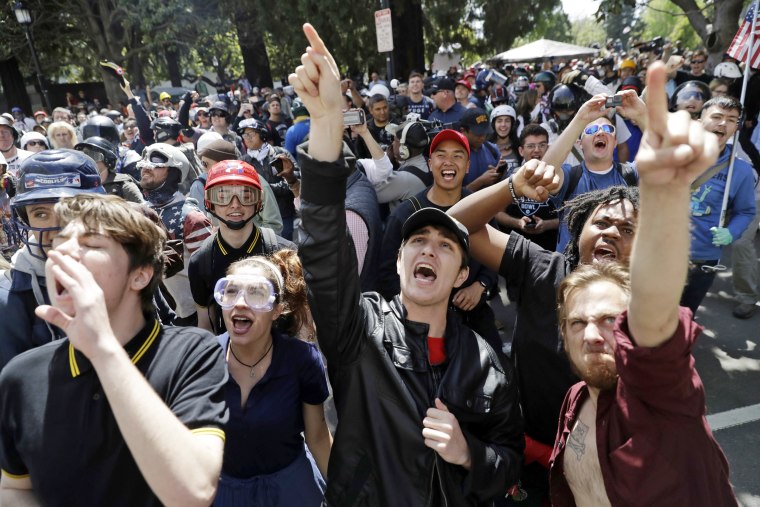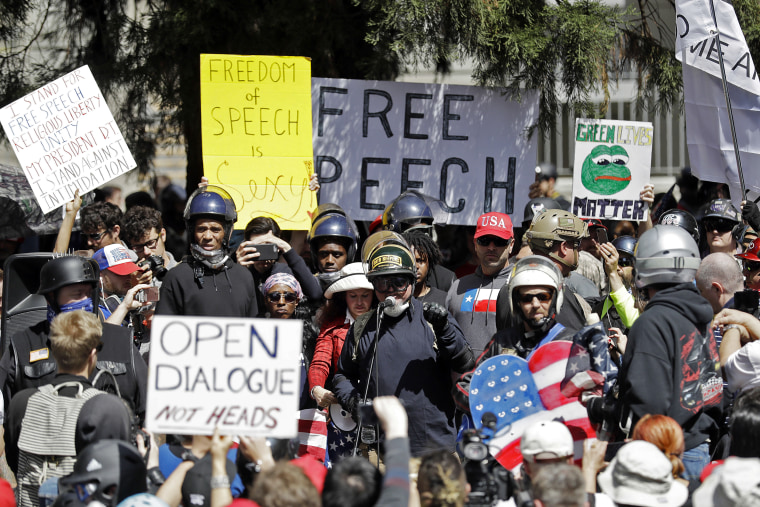The battle for free speech continues to wage on college campuses.
The Wisconsin state Assembly passed a Republican-backed bill on Wednesday that would allow college administrators to expel students for "disrupting" campus speakers — a controversial piece of legislation that may be at odds with First Amendment rights, many lawmakers and legal experts argue.
The Campus Free Speech Act, which came out of the Assembly without a single Democratic vote, will clamp down on University of Wisconsin students who "materially and substantially disrupt the free expression of others" by imposing punitive measures on hecklers.
The bill still has the hurdles of getting past the state Senate as well as Governor Scott Walker, who has already signaled that he will sign it.
“Thanks to the Assembly for their commitment to free speech on UW campuses,” posted Walker on Twitter on Thursday morning.
The legislation was drafted by Republican lawmakers who'd become frustrated with protests largely against right-wing speakers.
"Repeatedly, we’ve seen students shouted down and silenced by those in disagreement and unconstitutional policies that violate the First Amendment on the books at the UW," said Rep. Jesse Kremer, the bill's lead sponsor, in a statement.
"The Campus Free Speech Act will end the unconstitutional "heckler’s veto" and create a behavioral shift on campus," he said.

The bill comes amid a nationwide debate on how to balance open discourse with objectionable speech on college campuses — a push and pull that has led several universities to drop conservative speakers amid student protest.
The University of California at Berkeley recently canceled scheduled speeches by conservative provocateurs Ann Coulter and Milo Yiannopoulos due to mass protest by students.
An appearance by author Charles Murray, who wrote a controversial book linking race to intelligence, sparked violent demonstrations at Vermont's Middlebury College forcing the school to open an independent investigation.
And in an incident at the University of Wisconsin — which helped inspire the legislation — former Breitbart editor Ben Shapiro was drowned out with shouts for several minutes when he attempted to take to the mic. Campus police ultimately put a stop to the jeering and Shapiro continued his speech.
The new bill would work on a 'three strikes' policy.
Under the proposed legislation, a student would face hefty penalties the first time they disrupt a speaker. Two complaints of "violent or other disorderly conduct" would trigger a hearing by the school’s Board of Regents as well as a minimum one-semester suspension.
A third complaint woul get the student kicked out of school.
Democratic lawmakers vehemently oppose the bill and say it could cause significant effects on college campuses.
"It basically gags and bags the First Amendment," Wisconsin Rep. Chris Taylor told the Associated Press.
"Our colleges and universities should be a place to vigorously debate ideas and ultimately learn from one another," said Wisconsin Rep. Lisa Subeck, according to the Milwaukee Journal Sentinel. "Instead, this campus gag rule creates an atmosphere of fear where free expression and dissent are discouraged."
Zachary Wood, a rising senior at Williams College who testified before Congress on free speech on college campuses, said he agrees with the notion that college should be about "open and robust conversation and debate," but the punishment of expulsion "goes a little too far."
"It’s excessively punitive," he said. "There are other ways to discipline students that are less harsh," he said. "And more importantly, schools have to educate and explain the principles behind free speech to a student who doesn’t understand."
The policy evokes legal implications that may not hold up in court, said Katherine Franke, a professor at Columbia University School of Law.

“This bill clearly violates the First Amendment as its definition is way too broad and way too vague by Constitutional grounds," she said. "It clearly risks punishing speech that would otherwise be protected by the First Amendment."
The policy is essentially a "zero-sum approach” she said. "Telling a student you can’t interfere with another’s right to free speech interferes with their right to free speech," she said.
It also could also have a chilling effect on future speech because of the fear of being prosecuted by the school and getting expelled or being prosecuted by the speaker, she said.
The language is not clear, which is troublesome, said Susan Bloch, a professor at Georgetown University's School of Law.
“The problem is that we don’t really know what “disorderly conduct” means,” she said. This could mean different things to different people, she said.
The First Amendment does not protect people who engage in violence, so if that is what is aimed to be curbed, the First Amendment would not apply, she said. “But this is trying to punish more than violence, which can be problematic,” she said.
“The goal of the school should be to provide a safe space for everyone to speak, and it's not clear that’s what’s happening here,” she said.